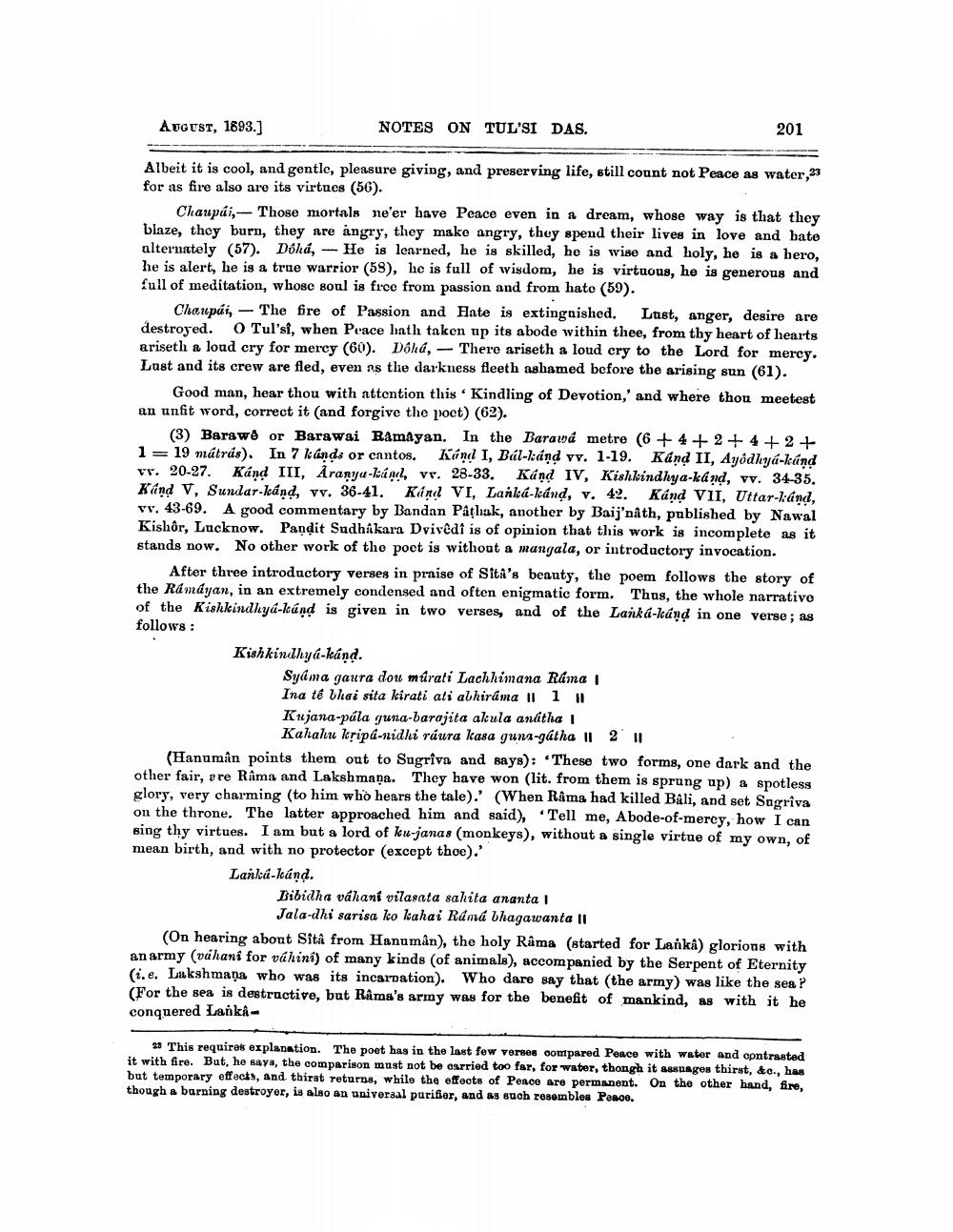________________
AUGUST, 1893.]
NOTES ON TUL'SI DAS.
201
Albeit it is cool, and gentle, pleasure giving, and preserving life, still count not Peace as water, 23 for as fire also are its virtues (56).
Chaupái,- Those mortals ne'er bave Peace even in a dream, whose way is that they blaze, thoy burn, they are angry, they make angry, they spend their lives in love and hate alternately (57). Dóhá, -He is learned, he is skilled, he is wise and holy, he is a hero, he is alert, he is a true warrior (58), he is full of wisdom, he is virtuous, he is generous and full of meditation, whose soul is free from passion and from hato (59).
Chaupái, -The fire of Passion and Hate is extinguished. Ltust, anger, desire are destroyed. Tulisi, when Peace hath taken up its abode within thee, from thy heart of hearts ariseth a loud cry for mercy (60). Dôlá, — There ariseth a loud cry to the Lord for mercy. Lust and its crew are fled, even ns the darkness fleeth ashamed before the arising sun (61).
Good man, hear thou with attention this Kindling of Devotion,' and where thou meetest an unfit word, correct it (and forgive the poet) (62).
(3) Barawd or Barawai Ramayan. In the Barawá metre (6 + 4+2 +4 +2 + 1= 19 mátrás). In 7 kands or cantos. Kind I, Bál-kánd vv. 1.19. Kand II, Ayodhya-kúnd vr. 20-27. Kánd III, Aranyu-lúnd, vv. 28-33. Kánd IV, Kishkindhya-kand, vv. 34-35. Kánd V, Sundar-kánd, vv. 36-41. Kánd VI, Lanká-kánd, v. 42. Kánd VII, Uttar-känd, vr. 43-69. A good commentary by Bandan Pathak, another by Baij'nåth, published by Nawal Kishôr, Lucknow. Pandit Sudhikara Dvivedi is of opinion that this work is incomplete as it stands now. No other work of the poet is without a mangala, or introductory invocation.
After three introductory verses in praise of Sita's beauty, the poem follows the story of the Rámáyan, in an extremely condensed and often enigmatic form. Thus, the whole narrative of the Kishkindhya-kúnd is given in two verses, and of the Lanka-ledyd in one verse; as follows:
Kishkindhyá-kánd.
Syama gaura dou murati Lachhimana Ráma 1 Ina té Chai sita kirati ali abhirama II 1 11 Kujana-pála guna-barajita akula anatha
Kahahu kripa-nidhi ráura kasa guma-gátha | 2 I (Hanuman points them out to Sugriva and says): "These two forms, one dark and the other fair, ore Rama and Lakshmana. They have won (lit. from them is sprung up) a spotless glory, very charming (to him who hears the tale).' (When Råma had killed Bali, and set Sogriva on the throne. The latter approached him and said), "Tell me, Abode-of-mercy, how I can sing thy virtues. I am but a lord of ku-janas (monkeys), without a single virtue of my own, of mean birth, and with no protector (except thoe).'
Lanka-kúnd.
Bibidha váhani vilasata sahita ananta
Jala-dhi sarisa ko kahai Rúmá bhagawanta II (On hearing about Sitâ from Hanuman), the holy Rama (started for Lanka) glorions with an army (váhani for váhini) of many kinds of animals), accompanied by the Serpent of Eternity (i.e. Lakshmana who was its incarnation). Who dare say that (the army) was like the sea ? (For the sea is destructive, but Râma's army was for the benefit of mankind, as with it he conquered Lanka
23 This requires explanation. The poet has in the last few verses compared Peace with water and opntrasted it with fire. But, he says, the comparison must not be carried too far, for water, thongh it assuages thirst, &o., has but temporary effects, and thirst returns, while the effects of Pence are permanent. On the other hand, fire, though a burning destroyer, is also an universal purifier, and as such resemblea Ponce.




